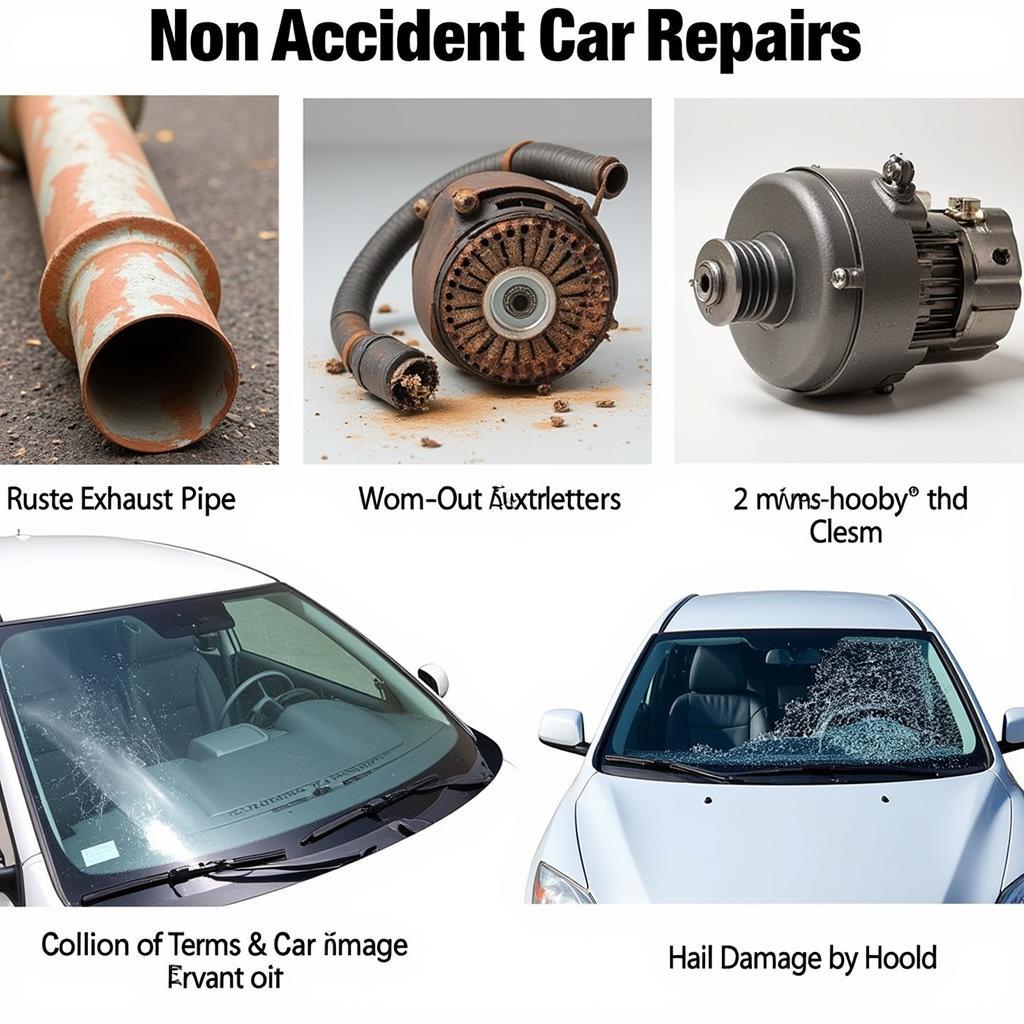Does car insurance cover non-accident repairs? This is a common question among car owners. Understanding what your insurance covers beyond accidents can save you money and stress down the road. This article explores the nuances of non-accident car repair coverage, helping you navigate the complexities of your policy.
Understanding Non-Accident Car Repairs
Non-accident repairs encompass a wide range of issues, from wear and tear to environmental damage. This can include anything from a faulty alternator to a rusted exhaust pipe, or even damage from hail or flooding. Knowing what your policy covers within this broad category is crucial.
Having a comprehensive understanding of your car insurance policy is important. You might be surprised to learn that some policies can cover repairs related to mechanical breakdowns or even damage from extreme weather events. However, the extent of this coverage varies greatly depending on your specific policy and insurance provider. It’s essential to read your policy documents carefully. Don’t hesitate to contact your insurance company directly to clarify any doubts you may have. They can provide specific details about your coverage and explain what types of non-accident repairs are included. For more information on claiming repairs, see if you can i claim car insurance for repairs.
 Examples of Non-Accident Car Repairs
Examples of Non-Accident Car Repairs
What Does Your Car Insurance Typically Cover?
Most basic car insurance policies primarily cover damages resulting from accidents. These policies focus on liability coverage for injuries and property damage to others involved, and collision coverage for damage to your own vehicle. These standard policies generally don’t cover non-accident repairs. For issues related to cracks in your windshield, learn how to repair small crack in car windshield.
When Does Comprehensive Coverage Come In?
Comprehensive coverage is an optional add-on to your standard car insurance policy that offers broader protection. This is where coverage for non-accident repairs often comes into play. Comprehensive coverage can protect your vehicle from a variety of situations, including:
- Weather-related damage: Hail, floods, fire, falling objects.
- Vandalism and theft: Damage caused by malicious acts or theft attempts.
- Animal collisions: Damage resulting from hitting an animal.
- Glass breakage: Chips or cracks in your windshield or windows not related to a collision.
While comprehensive coverage can be beneficial, it’s important to remember that it’s not a catch-all. Specific exclusions and limitations may still apply, and the exact coverage will vary between insurance providers.
Does Car Insurance Cover Mechanical Breakdowns?
Mechanical breakdowns are typically not covered by standard or comprehensive car insurance policies. These policies are designed to cover unforeseen events, not the gradual wear and tear that leads to mechanical failures.
If you are looking for information on whether car insurance covers other specific repairs like engine repairs or bad repairs from a previous mechanic visit, consider checking out: does car insurance cover engine repairs and does car insurance cover bad repairs. This will give you a better understanding of what is covered and how to proceed with such repairs.
Some insurers may offer optional mechanical breakdown insurance, which can help cover the cost of repairs resulting from mechanical failures. This type of coverage often functions similarly to an extended warranty.
Understanding Your Policy
“The devil is in the details,” says Amelia Carter, a senior insurance advisor at AllState Insurance. “Always thoroughly review your policy documents or discuss the specifics with your insurance agent to understand what’s covered and what’s not. Don’t assume anything – ask questions!” This advice is crucial for understanding your non-accident repair coverage.
Claiming Non-Accident Repairs
If your vehicle sustains damage not related to an accident, the process for filing a claim is similar to filing a claim for accident-related damage. You will need to contact your insurance company, provide details about the incident, and potentially have your vehicle inspected. Be prepared to provide documentation, such as photos of the damage and any relevant repair estimates. You can find out more about claiming expenses on your insurance by checking out can i claim the car repair expenses on insurance.
Conclusion
Does car insurance cover non-accident repairs? The answer depends largely on your specific policy and the type of damage. While standard policies typically don’t, comprehensive coverage can offer protection for various non-accident scenarios. Understanding the details of your policy is vital. Always consult your insurance documents and contact your provider for clarification to ensure you’re adequately protected.
FAQ
- What is considered a non-accident repair?
- Does my basic car insurance cover hail damage?
- How do I file a claim for non-accident damage?
- What is mechanical breakdown insurance?
- Will my insurance cover damage from a falling tree?
- What if my car is vandalized?
- Does comprehensive coverage cover all non-accident repairs?
Common Scenarios for Non-Accident Repair Questions:
- Scenario 1: Your car is parked outside during a hailstorm and sustains significant damage.
- Scenario 2: A tree branch falls on your car while parked in your driveway.
- Scenario 3: Your car’s engine suddenly fails due to a mechanical malfunction.
- Scenario 4: Your car is vandalized overnight.
Further Assistance
For more information on related topics, explore these articles: how to repair small crack in car windshield and does car insurance cover engine repairs.
Need help with car repairs or diagnostics? Contact us via WhatsApp: +1(641)206-8880 or Email: cardiagtechworkshop@gmail.com. Our 24/7 customer support team is ready to assist you.

